- Home
- S. H. Jucha
Jatouche (Pyreans Book 3) Page 2
Jatouche (Pyreans Book 3) Read online
Page 2
With the beds extended and the Jatouche lying on their sides and humans sitting upright, there was finally an opportunity to talk.
“Will Tacticnok’s father approve access for us to your planet’s medical services?” Bryan asked.
“This is unknown,” Jaktook replied. “There will be those speaking for you and others speaking against your presence.”
“Your sixth Q-gate is enclosed. Why is that?” Olivia asked.
“Actually, that is gate number five,” Kractik corrected. “It leads to the Colony.”
“The colony of what?” Pete asked.
“That’s the name of the group of species that were elevated by the Messinants,” Jakkock, the linguist, explained. “They are a composition of aggressive species that act in support of one another. Their actions have made it impossible to establish diplomatic relationships. Without knowing their true name, they’ve been called the Colony.”
“Why has diplomacy failed?” Pete persisted.
“They bite first and ask no questions,” Kractik remarked, evincing a sour expression.
“The mandibles of the species strike deep and inject venom into the body,” Jaktook explained. “Within moments, a bitten individual is catatonic and dies soon afterwards. Their poisonous bite kills anyone whose skin they are able to penetrate.”
“The Jatouche first visited the Colony’s Q-gate dome centuries of annuals ago,” Jakkock continued. “At that time, there was no species in the dome. Over the annuals, we visited many more times, watching the planet’s development. We were aware when the sentients achieved spaceflight and knew they would soon decrypt the console’s information.”
“They came to Rissness late one evening,” Kractik said, picking up the story. “Gate number five activated, and the console operator called the dome’s commander. Individuals of the Colony arrived before the soldiers could reach the deck. The dome’s records detailed the event. Every trainee console operator is required to view the attack. It’s chilling to watch.”
“In the moments it took the soldiers to gain the deck, the Colony members attacked every sentient in sight, biting and clawing them,” Jaktook said. “The presence of two Crocians was invaluable. The pincers of the Colony members were unable to penetrate the Crocians’ scaled hides, and the alliance members’ massive jaws rendered the centipede-like and millipede-like sentients in two.”
“Three gate activations delivered more than thirty of the aggressive entities,” Jakkock added. “By the time the attackers were stopped, only the Crocians and half the soldiers survived. Every other visitor caught on the deck eventually died from the bites.”
“The Messinants informed us via the console that obstructing the platform with an object would prevent the arrival of anyone or anything through the gate,” Kractik said. “Immediately after the attack, soldiers heaped parts of the Colony members on gate five’s platform. But we hadn’t comprehended the Colony’s cleverness. They found a way to call to our platform, activate it, and send our obstruction to their dome. Once our platform was clear, they swarmed in again.”
Jakkock spread his hands in exasperation, as he said, “The soldiers grew tired of replacing the platform’s obstacles. That’s when our scientists and engineers created the wall and the weapons emplacement. The Colony members are free to visit and be eliminated on arrival.”
“A Q-gate’s weaponization is a contentious subject, as far as the alliance is concerned,” Jaktook said. “The taking of sentients’ lives can result in the species’ expulsion from the alliance. That the Colony killed thirty-four individuals from various other races, in addition to our soldiers, has had a great deal to do with moderating alliance reactions.”
“Have you sent anyone to the Colony’s dome?” Pete asked.
“When?” Jaktook replied, confused by the question.
“After the Colony began attacking you,” Pete clarified.
Jaktook and Kractik regarded Jakkock briefly. It was their thought that the translation application had failed.
To dispel the confusion, Jakkock said, “You’ve heard of the dangerousness of the Colony, and yet you ask if we’ve sent our soldiers or citizens to the Colony’s dome after they began attacking us?”
“That’s correct,” Pete replied pleasantly.
The Jatouche stared at the Pyreans in amazement.
It occurred to Jaktook that the humans had met a Crocian for the first time and braced the individual. They wouldn’t have known that Mangoth, a Crocian, was a combative male. And here they were asking if the Jatouche had investigated the Colony’s dome, knowing that death waited there for whoever journeyed through the gate. A formative thought to aid the Jatouche occurred to him, which he kept to himself.
Each race spent time discovering the more mundane things about each other. The discussions ranged across subjects of food, sleep habits, work schedules, and personal preferences. The time passed enjoyably for the group. Meals were eaten, and soon it was time to sleep.
The Jatouche cringed, as Bryan uncoupled small sensor relays that connected his prosthetics to the nerve endings in the stumps of his upper arm and upper thigh.
When the propulsion engineer pulled off his artificial limbs, Olivia quipped, “Yeah, I’d love to remove mine too, if only for the night.” Her ruined face was the result of an explosion, while working aboard the YIPS. The deadly gas fire took the life of her husband, who’d been walking next to her.
“Our medical personnel will permanently remove it for you, Olivia,” Kractik said, with great sincerity.
Jakkock chittered at Kractik to chide her.
“What?” asked Olivia, her eyes boring into Jakkock. She wasn’t in the mood for secrets. There was already too much the engineers didn’t know about the Jatouche, their world, and the alliance.
Jakkock chastised himself. It was a mistake to think of the Pyreans as an undeveloped species by viewing them through the lens of technological development. In social matters, he was dealing with individuals who could read him as well as he could read them.
“It’s not known if our present medical techniques are compatible with your physiology. It’s logical to assume that they aren’t. Time and funds will need to be spent to generate the science that will enable our medical teams to repair your decorations,” Jakkock explained, attempting a touch of humor by borrowing Tacticnok’s term for their infirmities.
“Are we talking about a short period of time or a lengthy one?” Bryan asked.
“First, Tacticnok must obtain permission from His Excellency Rictook,” Jaktook finished for the linguist. “After that, it will be a matter of weeks in Pyrean time to adapt our technology.”
“Then how long will it take to fix us?” Pete asked.
“Patience, my friends, you’re asking the wrong individual. These types of questions must be reserved for the medical director,” Jaktook replied, which ended the discussion.
-2-
Rumors
In the nearly three hundred years that humans occupied the orbital stations and domes of Pyre, there hadn’t been any greater shocks experienced by humans than those that had recently been delivered. An alien dome had been discovered on a distant moon and accidentally activated. Then, if that hadn’t caused enough consternation, aliens arrived, and Pyreans learned that the dome housed a gate that connected to a distant world.
The astonishment receded when the aliens, the Jatouche, gifted the Pyreans a massive device, an intravertor. The device was constructed at the YIPS and deployed by humans, implanting it on the planet’s surface. The intravertor filtered the heavily laden atmosphere of dust and noxious gases. In addition, humans discovered that the alien’s device produced excess energy, which was transmitted to the YIPS to help power one of the smelting lines.
Naturally, enthusiasm about every aspect of these events was spotty. This was because of the pronounced schisms in Pyrean society. Privileged downsiders occupied the planet’s domes. Their primary contribution to the populace was food. The tops
iders occupied two stations, the YIPS and the Jenkels Orbital Station or JOS. The YIPS produced metals, gases, mechanical parts, and circuitry, and the JOS was the population center for topsiders.
Then there were the spacers, who supplied the YIPS with ores and slush, frozen gases, for processing. A particular group of spacers, who worked for Captain Jessie Cinders, had formed an unlikely bond with Pyre’s empaths. It was an involved story as to how the independent-minded spacers had taken a young empath, Aurelia, under their protection. And their actions had earned them the respect and support of Captain Harbour, the leader of the empaths.
An indication of the current state of thinking of spacers, active and retired, could be heard at the Miner’s Pit, a cantina owned by Jessie Cinders.
“Would you go with the Jatouche, Maggie?” a retired spacer asked the manager and hostess of the Miner’s Pit.
Maggie paused in the midst of passing the table of spacers. “Do you mean would I go to Na-Tikkook to get rid of this lovely thing?” she said, hoisting her prosthetic arm. Then she added, with gusto, “Just let me know which ship I catch for Triton, when the shuttle’s departing, and how much coin I have to pay.”
Benny turned to his fellow retirees, who filled out the table. They were finishing their food and drink and had been discussing whether they would take the opportunity to get their injuries repaired, if offered the chance. Between them, they had three prosthetic limbs, two missing fingers, a lost eye, and a considerable amount of scar tissue. For most spacers, it was a matter of luck if they made it to retirement with some coin and no injuries. Usually, it was the ships’ officers who were the fortunate ones but not always.
“If the engineers come back looking whole, I’m asking to be put on the list just as soon as I can figure out who’s keeping one,” Benny remarked.
“What if they look whole, but there’s something alien in them?” a spacer asked the table.
That comment shut down the conversation, and soon thereafter, Maggie directed them to the bar to finish their drinks to make room for more diners.
The Starlight cantina, with its expensive clientele, was experiencing different conversations. The individuals were often company or ship owners or people who had inherited coin from family members. As such, the topics weren’t about the prospects of repairing damaged bodies. They concerned the burgeoning opportunities presented by the Jatouche intravertor.
Around a small table sat four investors, who met regularly.
“What’s the latest from the YIPS?” Trent Pederson asked.
“Same thing,” Hans Riesling replied. “The intravertor is performing within Jatouche specifications. It’s spitting out globules of fused atmospheric dust and gases and delivering power to the station.”
“The same amount of power?” Dottie Franks asked. “Isn’t it supposed to be clearing the air, which would mean the energy waves would be more likely to pass, wouldn’t they?”
Dottie was new to the group. She’d been left a substantial amount of coin when her husband was killed while mining. She’d decided to adopt the three savvy investors as mentors, joining their weekly evening meeting. An attractive widow, the elderly patrons were happy to have her company.
“The intravertor doesn’t clear out a space around it, Dottie,” Hans explained sympathetically. “Atmospheric conditions constantly mix the air.”
“According to engineers, it will take thirty or forty intravertors working for years, if not decades, to make a considerable difference in the atmosphere,” Oster Simian added.
“And we only have the one,” Dottie replied in a desultory fashion.
“For now,” Hans said. He had a twinkle in his eye that attracted the stares of his friends.
“What?” Trent asked.
Hans said genially to the others. “I find it interesting that the three of you think of the Jatouche primarily as aliens. Yes, yes, they are,” he added quickly, waving away the comments before they could be made. “Let’s not forget that it was probably the Jatouche engineer who was the target of the plumerase gas attack on the YIPS. And what did the Jatouche do in retaliation? They did nothing. They completed the intravertor, packed up their gear, and disappeared back through the gate. In addition, they took with them the three engineers, who helped them the most, to repair their bodies. Now, if they were humans from another world, what would you think about them?”
While the men contemplated answers, Dottie piped up. “I’d think they were extremely generous and tolerant.”
Her comment had Trent and Oster nodding in agreement.
“You’re thinking that the Jatouche aren’t done with us,” Trent proposed.
“I think they’re just getting started with us,” Hans replied, with a self-satisfied smile.
Downside in a dome, the three heads of the nascent domes’ council, Dorelyn Gaylan, Idrian Tuttle, and Rufus Stewart, met to discuss the ramifications of the Jatouche intravertor. The council had usurped the power of the domes’ governor, Lise Panoy, but had left her nominally in place. They’d taken the precaution of removing her powerful and dangerous security chief, Jordie MacKiernan. His body, like those of many other downsiders, was buried beneath Pyre’s ash-covered surface.
“What timeline do the engineers give us?” Rufus asked, worry evident on his face.
“Are you concerned about your bodies already?” Idrian riposted.
“This aspect of our discussion is premature,” Dorelyn scolded. She was the head of the Gaylan clan, which in economic terms was one of the domes’ most influential families. “There are more immediate concerns. Captains Jessie Cinders and Harbour grow more prominent in Pyrean eyes with every step they take. Right now, the conversation on everyone’s lips is whether the Jatouche can rehabilitate the engineers and what will happen next with the aliens.”
“It’s ironic,” Idrian said, sitting back in his chair and frowning. “Not long ago, the domes were the center of Pyrean power and attention. Now, it’s a moon with an alien gate.”
“And let’s not forget that the families don’t own a single ship that can reach Triton,” Dorelyn remarked. “We’re at the mercy of spacer captains if we want a seat at the table.”
“Are you referring to negotiations with the Jatouche?” Idrian asked.
“What else?” Dorelyn replied. “I’ve no idea what form the discussions will take, but as sure as I’m sitting here, I know they’ll happen. The Jatouche will be a part of Pyrean life for generations to come, if not forever, and we must ensure that the council is not left out.”
“Why are you so positive?” Rufus asked. He didn’t like the idea of aliens being involved in human society, especially if they might upset the balance of power.
“Harbour,” Dorelyn replied simply.
Dorelyn hadn’t counted on the empath leader becoming a political force, but the previous governor’s foolishness had ignited a tumultuous cascade of events. Years before, Markos Andropov had kidnapped a young empath and fathered two children by her. It was the escape of the elder daughter, Aurelia, who was taken in by spacers, which had led to the liaison of Captain Cinders and Captain Harbour. Suddenly, two fringe groups of Pyrean society, the spacers and the empaths, had banded together to form a strategic entity that was in the right place at the right time to welcome the Jatouche.
“Worse, the captains are getting wealthy hauling slush in that ancient colony ship,” Rufus added with envy.
“You can stop referring to Captain Harbour’s ship in that manner, Rufus,” Idrian commented. “Everyone calls the ship the Honora Belle or simply the Belle. The captain has put her coin to good use. She’s hired crew, engineers, and techs, who’ve brought their families aboard the ship, and she’s spent much of her surplus on upgrade equipment.”
“It would take a good-sized crew a few years to turn that aging vessel into a rehabilitated and robust ship,” Rufus retorted.
“Rufus, you really must keep abreast of information on subjects that can affect our business, even if you don’
t care much for them,” Dorelyn remonstrated. She watched a red flush of embarrassment creep up the sides of Rufus’ neck. Her eyes held Rufus, waiting for him to object. When he didn’t, she continued. “One of the clever things that Harbour did with her slush coin was buildout a large cantina onboard the Belle. It’s reported that the spacers in Cinders’ company love to rotate aboard the colony ship, while they’re at Emperion harvesting slush. They have access to comfortable cabins, a cantina, and the company of empaths.”
Rufus shuddered at the prospect of passing empaths in the ship’s corridors at every turn. He’d always abhorred the prospect of someone entering his head and manipulating his emotions.
Dorelyn and Idrian politely chuckled at Rufus’ reaction.
“Well, Rufus, Cinders’ crews don’t see it quite the same way you do,” Idrian said. “The rumors are that the spacers spend their downtime working on the ship’s needs, celebrating in the cantina at night, and enjoying the attention of grateful empaths.”
“Enough enjoying yourselves at my expense,” Rufus growled. “Dorelyn, what is it that you wanted to speak to us about?”
Dorelyn grew serious, and her sharp gaze demanded the men’s attention. “What I need the two of you to do is help me sell a project to the council. The families need to invest in a ship.”
“You want us to become miners?” Rufus moaned.
This time it was Idrian who threw a disappointing glance at his friend. “What type of ship, Dorelyn?” he asked.
“We must have the first passenger ship that will be capable of transport between the YIPS and Triton. It must be capable of landing on the moon and docking with JOS terminals arms,” Dorelyn replied.
Rufus’ mouth clicked shut. Dorelyn was thinking far in advance of him. He realized he’d spent the majority of the conversation’s time displaying his weaknesses, and he was determined to change that. “How far have you gotten toward locating a ship architect, estimating a budget, and determining a delivery date?” he asked.
Rufus was pleased when Dorelyn gave him an appraising glance, and he promised to spend more time accumulating knowledge on the spacers and empaths, especially those working for Cinders and Harbour.

 Nua'll
Nua'll Artifice
Artifice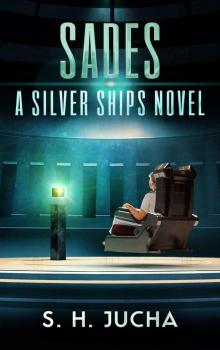 Sades
Sades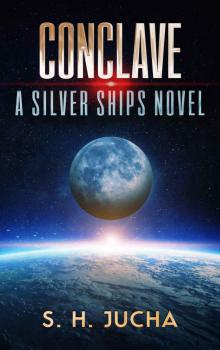 Conclave
Conclave Q-Gates
Q-Gates Talus
Talus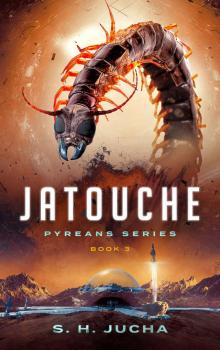 Jatouche (Pyreans Book 3)
Jatouche (Pyreans Book 3)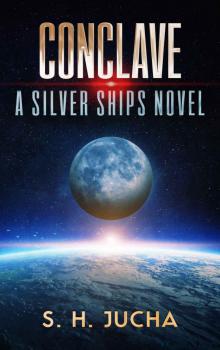 Conclave (The Silver Ships Book 20)
Conclave (The Silver Ships Book 20) Alliance
Alliance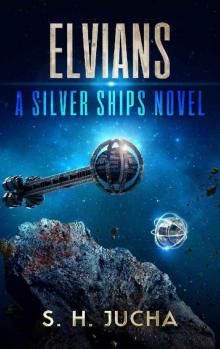 Elvians (The Silver Ships Book 18)
Elvians (The Silver Ships Book 18)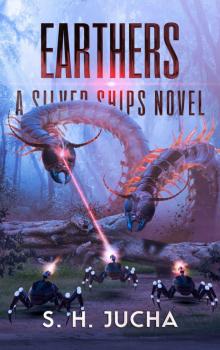 Earthers
Earthers Veklocks
Veklocks Sol (The Silver Ships Book 5)
Sol (The Silver Ships Book 5)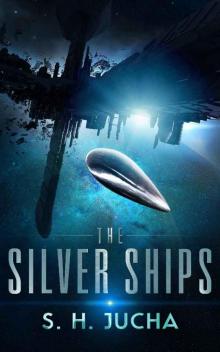 The Silver Ships
The Silver Ships Sojourn
Sojourn Haraken (The Silver Ships Book 4)
Haraken (The Silver Ships Book 4)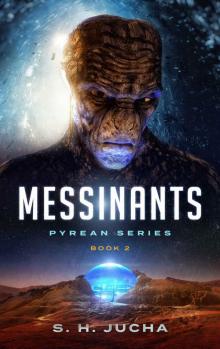 Messinants (Pyreans Book 2)
Messinants (Pyreans Book 2) Allora (The Silver Ships Book 7)
Allora (The Silver Ships Book 7)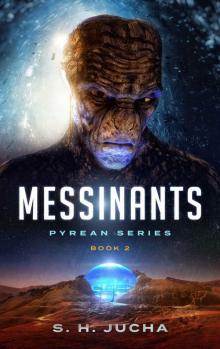 Messinants
Messinants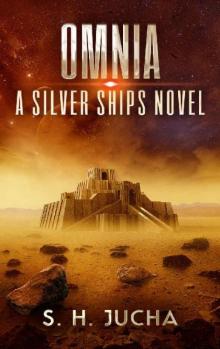 Omnia (The Silver Ships Book 9)
Omnia (The Silver Ships Book 9) Libre, A Silver Ships Novel (The Silver Ships Book 2)
Libre, A Silver Ships Novel (The Silver Ships Book 2)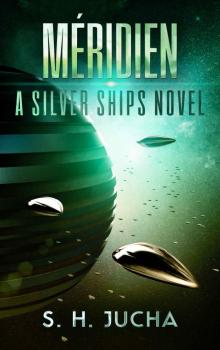 Méridien (The Silver Ships Book 3)
Méridien (The Silver Ships Book 3) Vinium (The Silver Ships Book 10)
Vinium (The Silver Ships Book 10)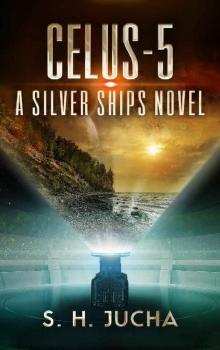 Celus-5 (The Silver Ships Book 8)
Celus-5 (The Silver Ships Book 8) Empaths (Pyreans Book 1)
Empaths (Pyreans Book 1)